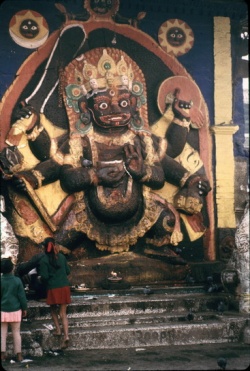Bhairava
The term Bhairava means "Terrifying". He is often depicted with frowning, angry eyes and sharp, tiger's teeth and flaming hair, stark naked except for garlands of skulls and a coiled snake about his neck. In his four hands he carries a noose, trident, drum, and skull. He is often shown accompanied by a dog.
Bhairava himself has eight manifestations: Kala Bhairava, Asitanga Bhairava, Samhara Bhairava, Ruru Bhairava, Krodha Bhairava, Kapala Bhairava, Rudra Bhirava and Unmatta Bhairava.
The origin of Bhairava can be traced to the conversation between Lord Brahma and Lord Vishnu recounted in "Shiv Maha-Purana" where Lord Vishnu asks Lord Brahma who is the supreme creator of the Universe. Arrogantly, Brahma tells Vishnu to worship him because he (Brahma) is the supreme creator. This angered Shiva who in reality is the creator of all. Shiva then incarnated in the form of Bhairava to punish Brahma. Bhairava beheaded one of Brahma's five heads and since then Brahma has only four heads. When depicted as Kala Bhairava, Bhairava is shown carrying the decapitated head of Brahma. Cutting off Brahma's fifth head made him guilty of having slain Brahma, and as a result, he was forced to carry around the head for years until he had been absolved of the sin.
Another story of the origin of Bhairava is the tale of Shakti, wife of Shiva. Shakti, the daughter of the king of gods, Daksha, had chosen to marry Shiva. Her father disapproved the alliance because he perceived Shiva as an ascetic associated with a frugal lifestyle, forest animals and ghosts. Eventually, Daksha held a yagna (a ritualistic sacrifice) and invited all the gods, but not Shakti and Shiva. Shakti came to the yagna alone, where Daksha publicly spoke in a belittling manner about Shiva. Shakti could not bear to hear her husband insulted and offered herself to the sacrificial fire.
When Shiva learned of this, he destroyed the yagna and killed Daksha by beheading him. Shiva carried Shakti's corpse on his shoulders and ran uncontrollably all around the world for days. Since this would eventually destroy all creation, Vishnu used his Sudarshan Chakra (divine discus) to cut Shakti's body into pieces, which then fell all around. These spots where Shakti's body parts fell are now known as Shakti Peethas. In the form of the frightful Bhairava, Shiva is said to be guarding each of these Shaktipeeths. Each Shaktipeeth temple is accompanied by a temple dedicated to Bhairava.
